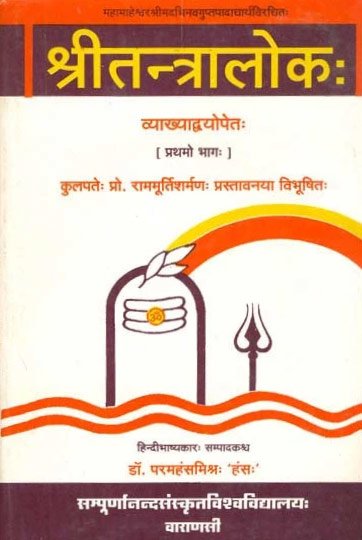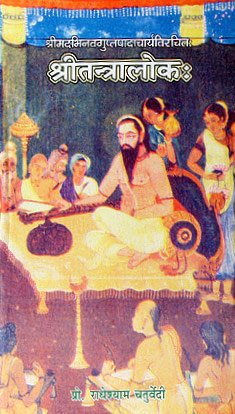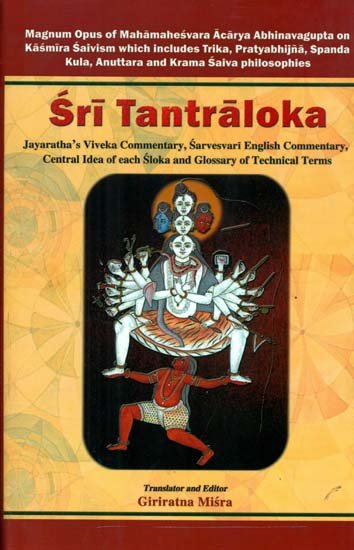Tantraloka [sanskrit text]
by Jun Takashima | 2020 | 46,255 words
The Sanskrit text of the Tantraloka of Abhinavagupta including grammatical analysis, English glossary and comparative print editions. The Tantraloka (“light on Tantra”) was written by Abhinavagupta in the 10th century in Kashmir and represents a major Encyclopedic work in Shaivism dealing with many core aspects and terminology.
Verse 16.98
क्वचिच्छोध्यं त्वविन्यस्य शोधकन्यासमात्रतः ।
स्वयं शुद्ध्यति संशोध्यं शोधकस्य प्रभावतः ॥ ९८ ॥
kvacicchodhyaṃ tvavinyasya śodhakanyāsamātrataḥ |
svayaṃ śuddhyati saṃśodhyaṃ śodhakasya prabhāvataḥ || 98 ||
The English translation of Tantraloka Verse 16.98 is contained in the book Sri Tantraloka by Satya Prakash Singh & Swami Maheshvarananda. This book is not available online so in order to read the full text and translation you should buy the book:
Buy now! English translation by Satya Prakash Singh & Swami Maheshvarananda (2015)
Glossary of Sanskrit terms
Note: This extracts Sanskrit terms and links to English definitions from the glossary, based on an experimental segmentation of verse (16.98). Some terms could be superfluous while some might not be mentioned. Click on the word to show English definitions.
Kva, Acit, Shodhya, Tva, Vinyasya, Shodhaka, Nyasa, Atra, Tas, Svayam, Shuddhi, Ati, Samsha, Prabhavatah, Prabhavat,
Analysis of Sanskrit grammar
Note: this is an experimental feature and only shows the first possible analysis of the Sanskrit text (Tantraloka Verse 16.98). If the system was successful in segmenting the sentence, you will see of which words it is made up of, generally consisting of Nouns, Pronouns, Verbs, Participles and Indeclinables. Click on the link to show all possible derivations of the word.
- Line 1: “kvacicchodhyaṃ tvavinyasya śodhakanyāsamātrataḥ ”
- kva -
-
ku (indeclinable particle)[indeclinable particle]kva (indeclinable)[indeclinable]ku (noun, feminine)[compound], [adverb], [nominative dual], [vocative dual], [accusative dual]kū (noun, feminine)[compound], [adverb], [vocative single]
- acicch -
-
acit (noun, feminine)[compound], [adverb], [nominative single], [vocative single]acit (noun, masculine)[compound], [adverb], [nominative single], [vocative single]acit (noun, neuter)[compound], [adverb], [nominative single], [vocative single], [accusative single]
- śodhyam -
-
śodhya (noun, masculine)[adverb], [accusative single]śodhya (noun, neuter)[adverb], [nominative single], [accusative single]śodhyā (noun, feminine)[adverb]√śudh -> śodhya (participle, masculine)[adverb from √śudh]√śudh -> śodhya (participle, neuter)[adverb from √śudh]√śudh -> śodhyā (participle, feminine)[adverb from √śudh]√śudh -> śodhya (participle, masculine)[accusative single from √śudh class 1 verb], [accusative single from √śudh class 4 verb], [accusative single from √śudh]√śudh -> śodhya (participle, neuter)[nominative single from √śudh class 1 verb], [accusative single from √śudh class 1 verb], [nominative single from √śudh class 4 verb], [accusative single from √śudh class 4 verb], [nominative single from √śudh], [accusative single from √śudh]
- tva -
-
tva (noun, neuter)[compound], [vocative single]
- vinyasya -
-
vinyasya (noun, masculine)[compound], [vocative single]vinyasya (noun, neuter)[compound], [vocative single]
- śodhaka -
-
śodhaka (noun, masculine)[compound], [vocative single]śodhaka (noun, neuter)[compound], [vocative single]
- nyāsam -
-
nyāsa (noun, masculine)[adverb], [accusative single]
- ātra -
-
ātra (noun, neuter)[compound], [vocative single]
- taḥ -
-
tas (noun, masculine)[compound], [vocative single]tas (noun, neuter)[compound], [nominative single], [vocative single], [accusative single]ta (noun, masculine)[nominative single]
- Line 2: “svayaṃ śuddhyati saṃśodhyaṃ śodhakasya prabhāvataḥ ”
- svayam -
-
svayam (indeclinable)[indeclinable]
- śuddhya -
-
śuddhi (noun, feminine)[compound], [adverb], [nominative dual], [vocative dual], [accusative dual]
- ati -
-
ati (indeclinable adverb)[indeclinable adverb]ati (indeclinable)[indeclinable]
- saṃśo -
-
saṃśa (noun, masculine)[nominative single]
- dhyam -
-
dhyā (noun, feminine)[adverb]
- śodhakasya -
-
śodhaka (noun, masculine)[genitive single]śodhaka (noun, neuter)[genitive single]
- prabhāvataḥ -
-
prabhāvataḥ (indeclinable)[indeclinable]prabhāvat (noun, masculine)[accusative plural], [ablative single], [genitive single]prabhāvat (noun, neuter)[ablative single], [genitive single]
Other editions:
Also see the following editions of the Sanskrit text or (alternative) English translations of the Tantraloka Verse 16.98
Sri Tantraloka (Set of 8 Volumes)
by Paramahansa Mishra (2000)
[श्री तन्त्रालोकः (संस्कृत एवं हिंदी अनुवाद)] Sanskrit Text with Hindi Translation; Published by Sampurnanand Sanskrit University; With two commentaries: Viveka (विवेक) by Ācārya Śrī Jayaratha and Nīrakṣīraviveka (नीरक्षीरविवेक) by Paramhans Mishra.
Buy now!
Tantraloka of Abhinavagupta (with Jnanavati Hindi commentary)
by Radheshyam Chaturvedi (2002)
[आचार्य अभिनवगुप्त द्वारा रचित तंत्रलोक: संस्कृत एवम् हिन्दी अनुवाद (पाँच खंडों में)] Sanskrit Text with Hindi Translation and Commentary; Published by Chaukhambha Vidya Bhawan.
Buy now!
Sri Tantraloka of Abhinavagupta
by Giriratna Misra (2018)
With Viveka Saṃskṛta Commentary by Rājānaka Jayaratha; Sanskrit Text, Transliteration, Sarveshwari English commentary; With Glossary and Central Idea of Each Śloka; Published by Chaukhamba Surbharati Prakashan
Buy now!![Tantraloka [sanskrit text] - book cover](/uploads/a/Tantraloka-Sanskrit.jpg)


